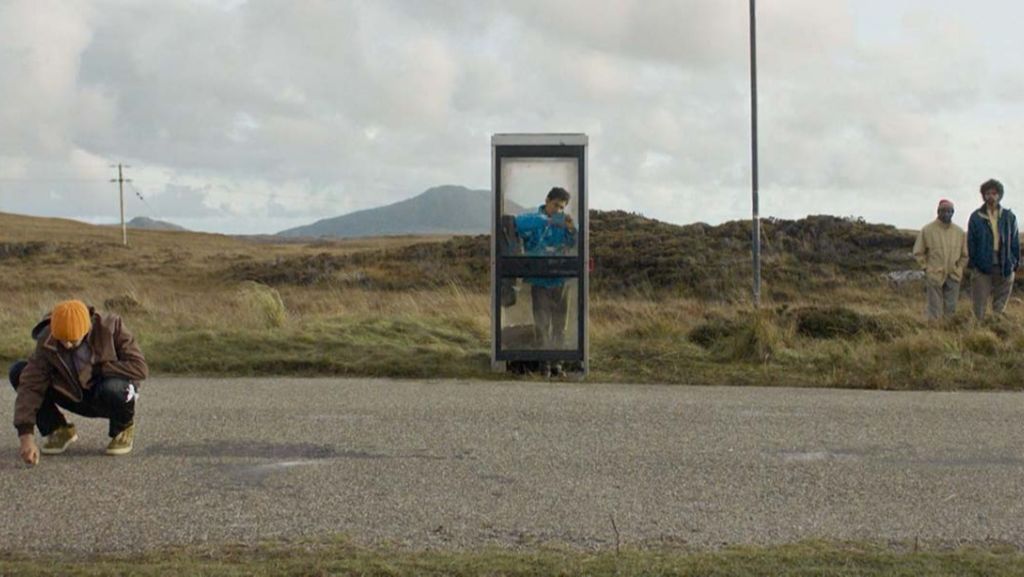Limbo review - quiet but voluble | reviews, news & interviews
Limbo review - quiet but voluble
Limbo review - quiet but voluble
Story of a Syrian in Scotland packs a gentle wallop

Displacement looms large over every quietly impressive frame of Limbo, writer-director Ben Sharrock's magnetic film about a young Syrian man called Omar (Amir El-Masry) who finds himself biding his time in the remotest reaches of Scotland on the way to some unknown new life.
Adrift from his family, who have made their way to Turkey, and thrown into the company of a motley array of fellow asylum-seekers, Omar spends his days thinking back on the glorious music he once made on his beloved oud and dealing with locals who are happy enough to provide a lift. If only they didn't pepper their apparent kindness with numerous jabs at what they perceive to be Omar's terrorist tendencies. Indrawn but infinitely observant, Omar looks out at the world with a mixture of wonder but weariness, too: yes, he's made it out of a country in ruin only to find himself in some sort of eternal-seeming way station during which he is forbidden to work, so can't do much but soak in the vast cloudscapes of Nick Cooke's atmospheric camerawork. Twice BAFTA-nominated this past spring, Limbo breaks with convention in its mood, which preferences gathering heartache and deadpan humour over the turbulent narrative one might expect of how these refugees ever arrived on British shores at all.
Indrawn but infinitely observant, Omar looks out at the world with a mixture of wonder but weariness, too: yes, he's made it out of a country in ruin only to find himself in some sort of eternal-seeming way station during which he is forbidden to work, so can't do much but soak in the vast cloudscapes of Nick Cooke's atmospheric camerawork. Twice BAFTA-nominated this past spring, Limbo breaks with convention in its mood, which preferences gathering heartache and deadpan humour over the turbulent narrative one might expect of how these refugees ever arrived on British shores at all.
Sharrock's script gets off to a neat start, showing the assemblage of arrivals to Britain who look on bemused at the latest in a sequence of cultural awareness classes presided over by Boris (Kenneth Collard) and Helga (Sidse Babett Knudsen), who constitute the most whacked-out double-act in a long while. (We're told the pair do a mean Sonny and Cher, even as they instruct their onlookers in correct nightclub etiquette.)
Left to chat among themselves, the men range from a Freddie Mercury-loving Afghani, Farhad (Vikash Bhai), to two Nigerian brothers, Abedi and Wasef, who get into an argument about the difference in meaning between "break" and "break up". (Kwabena Ansah and Ola Orebiyi are both terrific in those roles.) Omar pays keen attention throughout, in-between calls back home to his mum who is busy urging a rapprochement with his brother, Nabil, and the nursing of a prolonged wrist injury which is keeping Omar from the music-making that was his life. Throughout it all, the British Egyptian El-Masry (pictured above centre) is a marvel, never once overplaying his hand or italicising the role for effect.
At times, the film is a bit too contemplative: style, one feels during the first hour especially, risks taking precedence over substance. But the measured nature of Sharrock's story-telling pays off as it proceeds toward an ending that hints at a possible breakthrough of sorts or at least to the course of action famously defined by that master of waiting, Samuel Beckett: "I can't go on, I'll go on," the Irishman famously wrote, as if to prescribe for Omar the only way forward and out into the light.
Add comment
The future of Arts Journalism
You can stop theartsdesk.com closing!
We urgently need financing to survive. Our fundraising drive has thus far raised £49,000 but we need to reach £100,000 or we will be forced to close. Please contribute here: https://gofund.me/c3f6033d
And if you can forward this information to anyone who might assist, we’d be grateful.

Subscribe to theartsdesk.com
Thank you for continuing to read our work on theartsdesk.com. For unlimited access to every article in its entirety, including our archive of more than 15,000 pieces, we're asking for £5 per month or £40 per year. We feel it's a very good deal, and hope you do too.
To take a subscription now simply click here.
And if you're looking for that extra gift for a friend or family member, why not treat them to a theartsdesk.com gift subscription?
more Film
 Little Trouble Girls review - masterful debut breathes new life into a girl's sexual awakening
Urska Dukic's study of a confused Catholic teenager is exquisitely realised
Little Trouble Girls review - masterful debut breathes new life into a girl's sexual awakening
Urska Dukic's study of a confused Catholic teenager is exquisitely realised
 Young Mothers review - the Dardennes explore teenage motherhood in compelling drama
Life after birth: five young mothers in Liège struggle to provide for their babies
Young Mothers review - the Dardennes explore teenage motherhood in compelling drama
Life after birth: five young mothers in Liège struggle to provide for their babies
 Blu-ray: Finis Terrae
Bleak but compelling semi-documentary, filmed on location in Brittany
Blu-ray: Finis Terrae
Bleak but compelling semi-documentary, filmed on location in Brittany
 Oslo Stories Trilogy: Sex review - sexual identity slips, hurts and heals
A quietly visionary series concludes with two chimney sweeps' awkward sexual liberation
Oslo Stories Trilogy: Sex review - sexual identity slips, hurts and heals
A quietly visionary series concludes with two chimney sweeps' awkward sexual liberation
 Sorry, Baby review - the healing power of friendship in the aftermath of sexual assault
Eva Victor writes, directs and stars in their endearing debut feature
Sorry, Baby review - the healing power of friendship in the aftermath of sexual assault
Eva Victor writes, directs and stars in their endearing debut feature
 Blu-ray: Who Wants to Kill Jessie?
Fast-paced and visually inventive Czech comedy
Blu-ray: Who Wants to Kill Jessie?
Fast-paced and visually inventive Czech comedy
 Oslo Stories Trilogy: Love review - freed love
Gay cruising offers straight female lessons in a heady ode to urban connection
Oslo Stories Trilogy: Love review - freed love
Gay cruising offers straight female lessons in a heady ode to urban connection
 Beating Hearts review - kiss kiss, slam slam
Romance and clobberings in a so-so French melodrama
Beating Hearts review - kiss kiss, slam slam
Romance and clobberings in a so-so French melodrama
 Materialists review - a misfiring romcom or an undercooked satire?
Writer-director Celine Song's latest can't decide what kind of film it is
Materialists review - a misfiring romcom or an undercooked satire?
Writer-director Celine Song's latest can't decide what kind of film it is
 theartsdesk Q&A: actor Leonie Benesch on playing an overburdened nurse in the Swiss drama 'Late Shift'
The Guildhall-trained German star talks about the enormous pressures placed on nurses and her admiration for British films and TV
theartsdesk Q&A: actor Leonie Benesch on playing an overburdened nurse in the Swiss drama 'Late Shift'
The Guildhall-trained German star talks about the enormous pressures placed on nurses and her admiration for British films and TV
 Freakier Friday review - body-swapping gone ballistic
Lindsay Lohan and Jamie Lee Curtis's comedy sequel jumbles up more than their daughter-mother duo
Freakier Friday review - body-swapping gone ballistic
Lindsay Lohan and Jamie Lee Curtis's comedy sequel jumbles up more than their daughter-mother duo

Comments
Such a wonderful film and